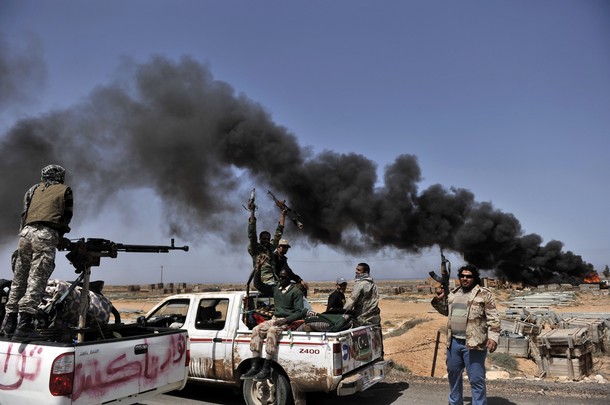
From the NATO Defense College: There was certainly disagreement and probably disappointment on individual positions of individual allies. Still there was no break in the Alliance, across the Atlantic or between “Old” and “New” Europe. Different views still exist but there is no level of resentment comparable to previous severe crises in NATO. Furthermore, NATO’s action is based on the solid legal ground of a strong UNSC Resolution. …
With UN SC Resolution 1973, NATO has received special prominence, since the resolution not only calls upon states to act but also “regional organizations or arrangements” (which addresses the debate of whether NATO is an international organization or a regional arrangement).
For NATO, though not openly expressed, [Libyan leader Muammar] Gaddafi remaining in power is not a realistic option. Although UNSC Resolution 1973 does not define regime change in Libya as a goal, “protection of the civilian population” under the current regime is a contradiction. In practical terms, Alliance and coalition partners have effectively obliged themselves to topple the Libyan leader and his family. …
History suggests that the longer the operation continues, the greater the chance that internal pressures will work against NATO and the coalition. The sooner the resolution, the greater the chance for a successful outcome. …
Since most NATO members have taken sides in what amounts to a civil war, the NATO-led coalition (respectively individual NATO member states) must support the rebellion now with air power, intelligence sharing, training and logistical support (including weapons and ammunition). Military operations should focus on support for anti-Gaddafi forces and the need to avoid civilian casualties as far as possible. …
NATO’s engagement cannot be unconditional. Should NATO fail in engaging Libya’s neighbours and should lose the support of North African countries, NATO should end the mission and withdraw.
Even after a fall of the current regime and a takeover by rebel groups, Libya is likely to require an international nation-building effort. Because of the decade long dictatorship through the Gaddafi clan, the country is lacking structures and institutions for governance. Leaving the country without support in building these elements of statehood and governance could lead to chaos and anarchy.
Actors in this effort should be primarily regional neighbours, respectively the North African countries, supported by the UN, the African Union and the Arab League. Qatar and the United Arab Emirates are already playing a leading role. Still, Libya is in close geographical distance to Europe. The EU will have a key role to play here.
Excerpts from “NATO in Libya: the Alliance between emergency help and nation building.” The report is by Florence Gaub, Sandy Guptill, Richard D. Hooker, Karl-Heinz Kamp (a member of the Atlantic Council Strategic Advisors Group), Pierre Razoux, and Rolf Schwarz of the Research Division – NATO Defense College, Rome – 29 March 2011. (photo: Getty)
Image: getty%203%2030%2011%20Libyan%20rebels_0.jpg
